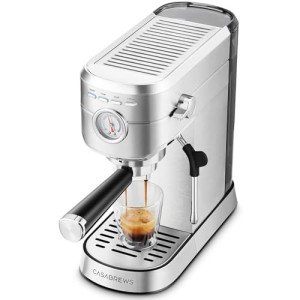Home Use Espresso Machines: A Comprehensive Guide
Espresso machines have actually become a staple in many homes as coffee lovers look for to reproduce café-quality brews in the comfort of their kitchens. The rise in appeal has actually resulted in a diverse market filled with various models, features, and rates. This short article aims to provide an informative introduction of home use espresso machines, assisting readers navigate their choices effectively.
Comprehending Espresso Machines
Espresso machines work by forcing hot water through finely-ground coffee under high pressure, resulting in a concentrated coffee drink referred to as espresso. There are a number of types of espresso machines classified based on their brewing methods and level of automation. The most typical types include:
- Manual Espresso Machines: These require the user to manage the pressure and water circulation, enabling a more hands-on coffee-making experience.
- Semi-Automatic Espresso Machines: These offer automatic control over water pressure, while the user manually grinds and tamps the coffee.
- Automatic Espresso Machines: With the push of a button, these machines instantly manage the flow of water, making it much easier to brew espresso with constant outcomes.
- Super-Automatic Espresso Machines: These all-in-one machines handle grinding, tampering, developing, and even milk frothing, making them ideal for users looking for convenience.
- Capsule or Pod Machines: These use pre-packaged coffee pods to create espresso with minimal effort, but they limit choice in developing strategies and tastes.
Table: Comparison of Espresso Machine Types
| Type | Control Level | Ease of Use | Cleaning up Level | Suitable For |
|---|---|---|---|---|
| Manual | User-controlled | Moderate | High | Coffee purists |
| Semi-Automatic | Partial automation | Moderate | Moderate | Home baristas |
| Automatic | Totally automated | Easy | Low | Hectic individuals |
| Super-Automatic | Totally automated | Very easy | Very low | Convenience applicants |
| Capsule/Pod | Totally automated | Really simple | Extremely low | Casual drinkers |
Key Features to Consider
When selecting a home use espresso machine, it's vital to consider different functions that can substantially affect the quality of espresso and user experience.
- Pressure: Look for machines that provide at least 9 bars of pressure, as this is thought about ideal for developing espresso.
- Boiler Systems: Single vs. dual boiler systems identify temperature stability and the ability to brew espresso and steam milk concurrently.
- Grinder: Integrated grinders permit newly ground coffee, which improves taste. Think about machines with adjustable grind settings.
- Milk Frother: For those who delight in coffees and lattes, an integrated steam wand or automatic frother is vital.
- Size and Design: Consider your kitchen area and aesthetic choices. Machines can be found in various sizes, from compact to large setups.
- Cost: Home espresso machines can range from a few hundred to a number of thousand dollars, so it's vital to establish a budget before exploring alternatives.
Advantages and disadvantages of Home Use Espresso Machines
| Pros | Cons |
|---|---|
| Benefit of brewing coffee at home | Preliminary financial investment can be high |
| Quality of espresso is typically superior | Needs some ability, particularly with manual machines |
| Capability to experiment with tastes | Maintenance and cleansing can be labor-intensive |
| Can conserve money in the long run | Not all machines will suit every coffee preference |
Upkeep and Cleaning Tips
Keeping an espresso machine is essential for prolonging its life and ensuring consistent brew quality. Here are some useful tips:
- Regular Descaling: Minerals from water can develop in the machine. Descale every 1-3 months, depending upon water solidity.
- Daily Cleaning: Rinse portafilters, baskets, and steam wands after each use to avoid coffee oils from developing residue.
- Use Filtered Water: This can help in reducing mineral accumulation and improve the taste of coffee.
- Change Gaskets and Seals: These parts may break gradually and ought to be replaced to keep pressure and efficiency.
- Check out the Manual: Each machine has particular care guidelines; following these will guarantee durability.
Frequently Asked Questions About Home Use Espresso Machines
Q1: What is the very best budget espresso machine?The best budget espresso machine often depends on private needs, however models like the DeLonghi EC155 or the Breville Bambino are popular among users for providing excellent worth. Q2: How long do home espresso machines usually last?With correct maintenance, home espresso machines can last anywhere from 5 to 15 years, depending upon the quality of the machine and frequency of use. Q3: Can I make coffees and lattes with any espresso machine?While most espresso machines can make coffees and lattes, having a reputable
steam wand or frother is necessary for achieving the best milk texture.
Q4: Are super-automatic machines worth the investment?For those who focus on benefit and fast developing, super-automatic machines can be worth the investment, though they might do not have some customizability in brew strength and flavor. Buy Espresso Online : What kinds of coffee beans are best for espresso?While personal preference plays a role, beans identified as" espresso "blends are generally roasted darker, developing abundant flavors and a creamy texture when brewed.
Buying a home espresso machine can transform the everyday coffee routine into something special, elevating home brews to café quality. By comprehending the different types of machines, crucial features to think about, upkeep requirements, and weighing the
pros and cons, consumers can make educated choices that suit their private choices. As Buy Espresso Online continues to grow, no matter the option, every brew can be a delicious experience waiting to be relished.

